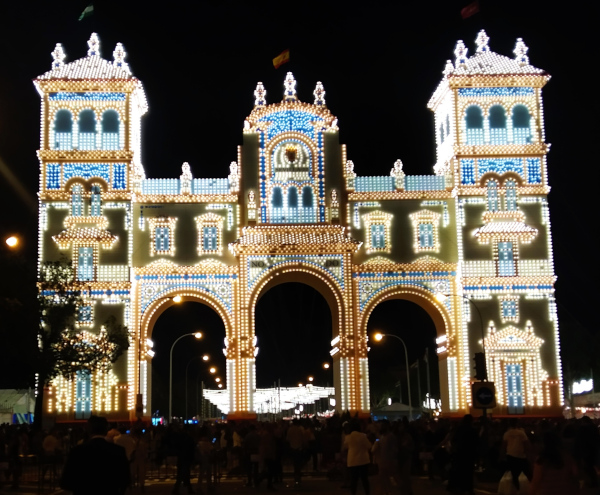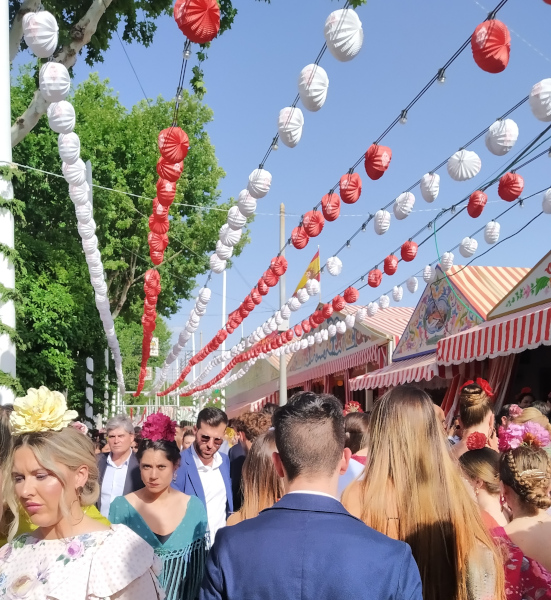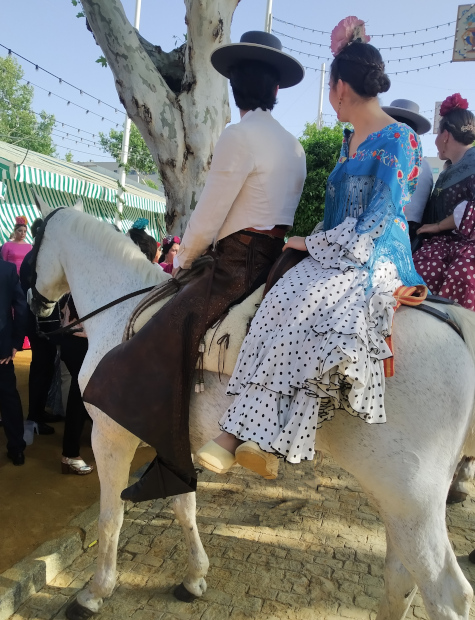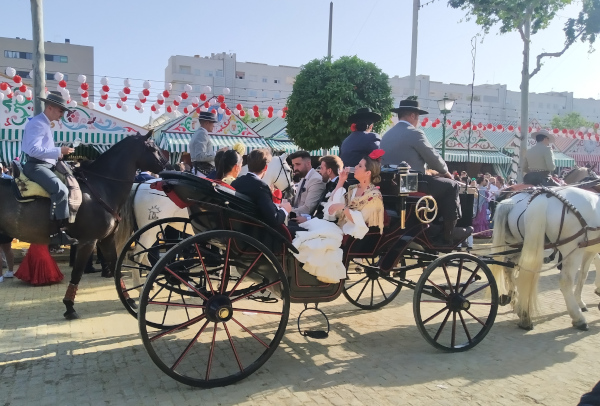Podcast 113 B2 - The Seville Fair and phrasal verbs
Phrasal verbs and adverbs to listen to
What do you say to somebody you have perhaps known for most of your life but you haven't seen for a year? This is the peculiar social situation that occurs in the April Fair in Seville every year. Today I'm going to be talking about the April Fair and also six B2 level phrasal verbs which are probably not the ones easily learnt but they can be very useful. So, here we go...
I'm going to give the meanings to six B2-level phrasal verbs and then I'm going to use them in context. What you can do as a task is to listen for these verbs when I later use them in context and identify the situations I use them in. The first verb is to date back to. We use this phrasal verb when we refer to the past, when we say something started.
The Pyramids of Giza date back to over 5000 years.
The next phrasal verb is to head for. This means to walk in the direction of, to go towards something.
As soon as we arrived in Marbella, we headed for the beach.
The next phrasal verb is, well, it isn't really a phrasal verb perhaps more a verb with a dependent preposition. This is used usually in the passive - devoted to. In this context, I'm referring to a place. It means a place is used for some event or activity.
The whole football stadium was devoted to the pop concert.
The next one is to stick together. To stick together refers to people who stay together, not to separate from each other.
We all stuck together while we were hiking so we wouldn't get lost.
The penultimate one is a phrasal verb - to come up. This meaning here is when a subject is mentioned in conversation. It is not a transitive verb - it is not followed by an object.
While Paco and Lucía were having a romantic dinner, the subject of marriage came up.
And the last one is another phrasal verb - to pass away. This is a nice way of saying 'to die' - less direct and more respectful. We would only use 'pass away' when talking about humans.
My great uncle passed away last Christmas. He was 89.
But I haven't finished there! I'm also going to give you some useful B2-level adverbs to use to begin sentences for your speaking test in the Cambridge exam, for example, or for writing the article. The words are: admittedly, originally, apparently, typically, fortunately and most importantly. I don't think the meanings need much explanation. Listen for them here and the context they are used in and, if you come over to Practising English dot com, podcast 113, you can study the audio script and copy these examples for your study notes. So now I'm going to start to talk about the Seville April Fair - listen for these verbs and adverbs as I speak...

The Seville April Fair exclusive for B2 students of English
Yesterday, I went to the first full day of the April Fair. Well, that name doesn't sound right at all, does it? Why? Because the first day of the fair actually fell on the first on May! It lasts a week and all seven days of the fair fall entirely in May. Why is that? Well, the April Fair always begins two full weeks after Holy Week and as Holy Week or Easter was very late this year, so was the April Fair. Admittedly, that doesn't happen often so this year is a fairly rare exception.
What is this April Fair? Well, it's a fairly unique event. That means it's quite special and there's nothing similar to it anywhere else. Mmm. That's not quite true, I suppose. Many of my Andalusian friends will say there are other fairs in other Andalusian cities and towns. That's true, but the Seville April Fair has many features that are unique to it.
How can I describe the April Fair? Originally, it wasn't a fair at all. It dates back to the middle of the nineteenth century. In those days, there was an important event for buying and selling cattle (cows and bulls) and horses. Farmers and business people came to Seville during April to trade - not to have fun. Then, small marquees or tents were set up for the traders and their families to have something to eat and drink during this seven-day event. As time went by, the fair became more and more a place for having fun and less and less a place to do business.

An important feature of today's Seville April Fair is the folk dance called sevillanas. Apparently, the origins of this folk dance go back to the times of the Catholic Monarchs in the fifteenth century. It's not just a dance but also music and song. Typically, there are four parts to a sevillana and people dance to it in pairs while somebody sings and others play guitars and percussion instruments. However, in the fair, although there are live groups, most of the music you hear is produced through speakers.
The entrance to the fair is through the a huge wooden and metal structure that is a copy of one of the gates that were originally in the city wall to the old city of Seville. Every year the entrance is pulled down and a new one built. It is covered in lights, and it this structure that is lit up at exactly 12 o'clock midnight on the first day of the fair. It's the place where most people head for when visiting the fair and it's there where people meet up with friends before they go on to other parts of the fair.
So, where do people go? The fair area is devoted to a number of 'streets'. Each street has the name of a famous bullfighter. However, instead of houses in these streets, there are marquees (tents of various sizes) called casetas in Spanish. The marquees are either green and white striped or red and white striped. One peculiar feature of the Seville April Fair is that nearly all of these marquees are private. They belong to families or groups of friends or perhaps to local companies in Seville. The cost of maintaining one of these marquees is relatively high so when the week of the fair arrives, many members take advantage of every single day and spend long hours in their marquee - going home to sleep for just a few hours each day. The fair is a very social event. People also invite friends, who are not members, to their caseta. So that's where people go - either to their own marquee or to visit a friend's.
The streets of the fair are not just devoted to humans. From early morning until eight o'clock in the evening, hundreds of horses invade the fair. Horses come with one or two riders - boyfriend and girlfriend, husband and wife or passengers in horse and carriage or coach often pulled by four or even six horses. The dress of the riders is strictly the short jacket and wide-brimmed Andalusian hat, riding trousers and boots for men and usually a brightly coloured flamenco dress for girls. The riders and carriages just seem to go round and round the fair visiting different marquees. On arrival, the caseta members bring out plastic cups of dry sherry called manzanilla for the riders, who drink seated on horseback.

When I visited the fair last Sunday, the crowds were tremendous. Not only were there hundreds of thousands of people to get past but you also have to avoid the horse traffic jams. If you're going with somebody, it's essential to stick together, otherwise you'll lose each other in the hustle and bustle (that means in the crowded chaos). Your mobile phone may not even help you as you'll never hear it ring in the incredible noise of the music and loud voices.
So, after living nearly thirty years in Seville I do know people - many of them my students or ex-students. I'm not a member of any marquee now although I used to be... But I do get invited and, although I'm not a great fan of the April Fair, I occasionally visit friends in their casetas. This is where you encounter the strange social situation of meeting up with people you probably haven't spoken to since the fair from the previous year. What happens is that all these delicate subjects come up and you find yourself asking questions you wished you hadn't.
'So, how's your wife, Vanesa?'
'Actually, Vanesa and I
aren't together anymore. We got divorced shortly after the last fair. This is
Pilar. We're getting married next month!'
'Oh, pleased to meet you, Pilar!'
'So, has your great aunt Natalia come with you this year, Paco?'
'Oh,
sorry. Didn't you know, Mike? My great aunt passed away
last Christmas. She was 92.'
'Oh, dear! I'm so sorry to hear that, Paco.
She was a lovely lady.'
This is not just my experience. It seems that many people meet up at the fair with people they've not spoken to for twelve months because they only see each other at the fair. This year was worse because due to the COVID-19 Pandemic, the last two years the fair was cancelled and didn't happen.

Fortunately, the Andalusians are very understanding people and nobody feels offended. The important thing is to get together with people, exchange news, have a drink together, something to eat and perhaps share a joke or two. People like to get onto the dance floor and dance sevillanas - which everybody seems to know how to dance it seems - even me - well or not so well.
And there is a lot of food eaten at the April Fair. Nearly all of the marquees have a kitchen with hired chefs and waiters behind the bar. The typical food is Spanish omelette, prawns, lots of different hot snacks called tapas and, most importantly, the famous Andalusian cured ham from the Iberian black pig. Olé and long live the April Fair!
Until next time. Goodbye for now!
Copyright © 2023 Practising English
All rights reserved